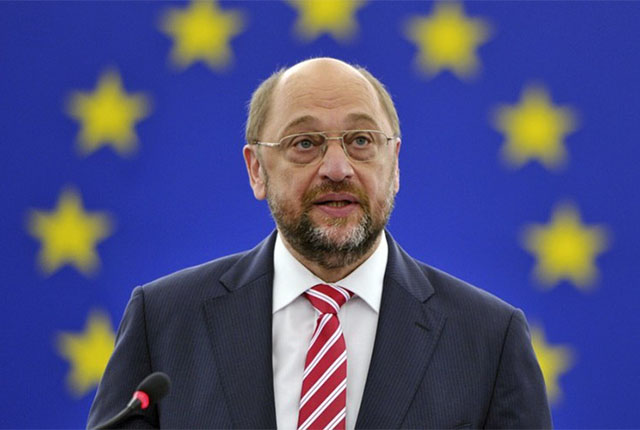Brexit divides Europe’s leaders


Martin Schulz
LONDON. – Europe’s leaders appear divided about how to negotiate Britain’s exit from the bloc as the president of the European parliament called on the UK government to “deliver now” on the referendum outcome and a key aide to Angela Merkel said Britain should “take the time to reconsider the consequences”.
As government and EU advisers yesterday began preparing next week’s crunch two-day Brussels summit, the US secretary of state, John Kerry, announced plans to travel to the Belgian capital and London today for urgent talks with British and EU officials. He urged the EU and UK to “minimise disruption” through a responsible handling of the split.
Martin Schulz, the president of the European parliament, led calls for exit talks to begin as early as tomorrow. “We expect the British government to deliver now,” he told Germany’s Bild am Sonntag. “The summit on Tuesday is the appropriate moment to do so.”
But with frustrations mounting at Britain’s seeming reluctance to begin divorce proceedings, Merkel, the German chancellor, has called for calm, clear-headed and businesslike discussions while other European capitals, EU leaders and her own government have demanded the UK’s rapid departure.
Merkel said there was no hurry for London to trigger article 50 of the Lisbon treaty, beginning a two-year negotiating process leading to Brexit. David Cameron has said he would leave that task to his successor, to be appointed by October.
“It should not take ages, that is true – but I would not fight now for a short time-frame,” Merkel said on Saturday.
Her chief of staff, Peter Altmaier, said on Sunday that politicians in Britain should “take the time to reconsider the consequences of the Brexit decision – but by that I emphatically do not mean Brexit itself”. Europe should “wait for this to happen with calm”.
The former Finnish prime minister, Alexander Stubb, also said yesterday that the EU should not push Britain too fast into launching a formal exit procedure. “This will be an extremely complicated set of negotiations, there will be hundreds and thousands of legal, political and economic implications,” Stubb told Reuters.
“After the initial shock, we should now take it easy and be patient, one step at a time. We should not be childish in thinking about punishing the UK.” Britain would end up with a Norway-type deal retaining close economic ties with the EU, but without a say on decision-making, he predicted.
The foreign ministers of the EU’s six founding members, however, demanded Britain start proceedings “as soon as possible” to avoid a long and potentially damaging period of uncertainty.
The Dutch foreign minister, Bert Koenders, told the Volkskrant: “We can’t have the kind of dithering Boris Johnson is suggesting. Everyone wants clarity: people, businesses, financial markets.”
France’s foreign minister, Jean-Marc Ayrault, urged Cameron to step down soon, saying: “A new prime minister must be designated – that will take a few days. But there is a certain urgency.” He added: “We have to give a new sense to Europe, otherwise populism will fill the gap.”
The German vice chancellor, Sigmar Gabriel, told the Handelsblatt business daily newspaper the EU would not make any fresh offers. “The British have now decided to go. We will not hold talks about what the EU can still offer the Britons to keep them in,” he said.
The European commission president, Jean-Claude Juncker, has also warned London not to drag things out. “It is not an amicable divorce,” he said, “but it was not an intimate love affair anyway.” Talks should start “immediately”, he said.
In a flurry of further diplomatic activity, Donald Tusk, the European council president who will chair the summit, is due to meet France’s president, François Hollande, on Monday morning, then travel to Berlin to meet Merkel and the Italian prime minister, Matteo Renzi, in the afternoon.
Meanwhile, a string of Labour shadow cabinet members have quit, with more walkouts expected, in protest at Jeremy Corbyn’s leadership over the EU referendum.
Among those to resign are Heidi Alexander, Lucy Powell and Ian Murray.
It comes after shadow foreign secretary Hilary Benn was sacked after he told Mr Corbyn he had lost confidence in him.
Corbyn faces a vote of no confidence following a “lacklustre” EU campaign but shadow chancellor John McDonnell said he “wasn’t going anywhere”.
McDonnell and shadow cabinet members Andy Burnham, Diane Abbott and Emily Thornberry have given Corbyn their support despite the resignations.
The Labour Party campaigned for Remain during the referendum, which saw the UK voting to leave the EU by 52 percent to 48 percent on Thursday.
But Corbyn – who has been a long-standing critic of the EU and who is regarded as the most Eurosceptic Labour leader in years – was accused by some in his party of not making the case for the EU forcefully enough.
As a result, a motion of no confidence against Corbyn has been submitted by Labour MPs Dame Margaret Hodge and Ann Coffey – and it is expected to considered at the next meet of Labour MPs on Monday. A secret ballot could be held the following day.
In another development, Scotland’s First Minister Nicola Sturgeon has told the BBC that Holyrood could try to block the UK’s exit from the EU.
SNP leader Ms Sturgeon said that “of course” she would ask MSPs to refuse to give their “legislative consent”.
However, Scottish Secretary David Mundell said he “personally” did not believe that Scotland could block Brexit.
In an interview with the BBC’s Sunday Politics Scotland programme Ms Sturgeon was asked what the Scottish Parliament would do now. – The Guardian/BBC









Comments